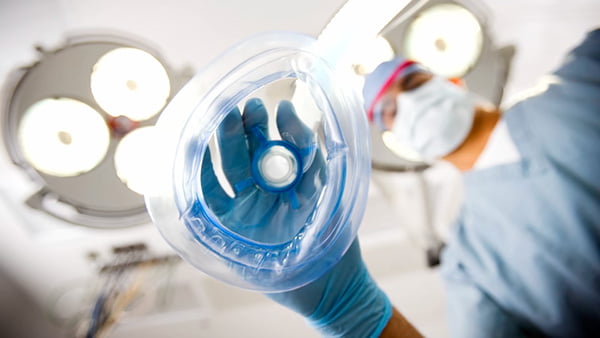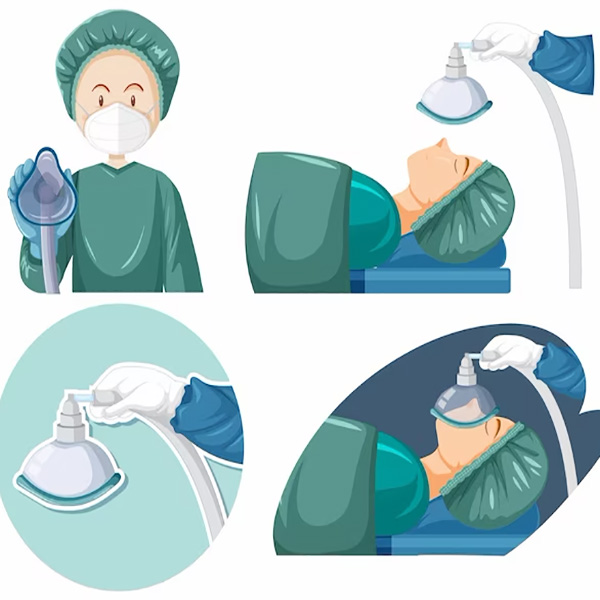Complications of anesthesia after nose surgery
Many people who want a nose job are afraid of the anesthesia itself and the complications of anesthesia after the nose job. They are right. The word surgery and anesthesia itself is frightening. But did you know that if the correct checks are done, there is no need to fear anesthesia complications after nose surgery.
What is general anesthesia?
First, let’s have a definition of anesthesia or more correctly general anesthesia. General anesthesia is a controlled state of anesthesia in which the entire mind is temporarily turned off. During a general anaesthetic, drugs are used to put you to sleep, so you are unaware of the surgery and do not move or feel pain during it.
General anesthesia is used for surgical procedures where it is safer or more comfortable for you to be sedated. It is usually used for long surgeries or those that are very painful without anesthesia.
It is not known exactly how it works, but all anesthetics are known to stop nerves from sending signals to the brain. It means you don’t feel anything.
Related articles: The best nose surgeon in Tehran
How to administer general anesthesia
Before the procedure, you will meet with a specialist doctor called an anesthetist to decide which anesthetic is right for you. This is one of the pre-operative assessments that your anesthesiologist will take.
Usually, the anesthesiologist will talk to you about the type or types of anesthesia that are right for you, explain the risks of anesthesia, and then choose a plan for anesthesia and control of your pain and body movement.
The anesthesiologist will review your medical history and ask if anyone in your family has had problems with anesthesia. They also ask about your general health and lifestyle, including whether you:
Have you had any allergies?
Do you smoke or drink alcohol?
Do you take any other medication?
The anesthesiologist can answer any questions you may have. If you are unsure about any part of the procedure or if you have any concerns, let them know. You should be given clear instructions to follow before the procedure, including whether you can eat or drink anything in the hours leading up to it.

The best nose surgeon in Tehran
Before and during your operation
Just before surgery, you will usually be taken to a room where the anesthesiologist will give you general anesthesia.
or it will be given as follows:
Fluid injected into your veins through a cannula (a thin plastic tube inserted into a vein, usually in the back of your hand)
The gas you breathe through the mask
The anesthetic should work very quickly. You’ll start to feel light-headed before passing out within a minute or so.
The anesthesiologist will be with you during the procedure. They will make sure you continue to receive the anesthetic and remain in a controlled state of anesthesia. They will also inject you with pain medication into your veins so that you don’t feel so much pain when you wake up.
Learn more: the side effects of nose surgery for the eyes
Although this is planned and aimed at improving the outcome for you, the bottom line is that when you have surgery, the doctor is cutting your skin and making corrections on your nose. And since rhinoplasty is one of the sensitive and very precise surgeries, it is necessary that your head remains without any movement.
Imagine the moment you cut your hand, completely involuntarily reacting quickly to the injury. The same thing happens to you if the anesthesia is not done correctly.
Often, the doctor can give you the necessary post-anesthesia warnings about what side effects to expect. Sometimes there will be complications — things that are not a normal part of the healing process. While the most common side effects mentioned below are usually not serious, some anesthesia side effects after nose surgery, such as blood clots, can be dangerous. And they slow your recovery.
Pay attention to what happens in your body and how you feel in the days and weeks after surgery. If you are concerned or notice something other than what you were told, call your doctor.
Pain in complications of anesthesia after nose surgery
Almost everyone has some pain after surgery. And the amount of it depends on how long before going to the operating room, the type of operation you have done and the level of your health.
Many procedures are now less “invasive,” or in other words, make fewer cuts on the surface of the skin—ultimately, it hurts less and you heal faster. And there are many options to ease your pain. Don’t worry too much about the pain in anesthesia complications after nose surgery. Dr. Hamidreza Rasti, who is one of the best rhinoplasty surgeons in Tehran, controls and controls the process of your nose with medicine.
Once your pain is well controlled, you’ll be more willing to move again, and that’s the key to getting back into your daily routine. You are also less likely to have complications such as blood clots or pneumonia.
Related articles: How to have a good nose job?
Symptoms and complications of anesthesia after nose surgery
When you wake up from being “under” you won’t feel your best. Common complaints include:
1- Discomfort and depression
2- Confusion
3- Shivering
4- itching
5- Sore throat
These symptoms usually do not last long.
Very rare side effects of anesthesia
These side effects and reactions are very rare, but do happen sometimes. Of course, not in rhinoplasty because of the shortness of rhinoplasty. These symptoms are mainly seen in anesthesia that lasts more than 6 hours. For some people, confusion and memory loss can last up to a week. And some people are at greater risk of long-term memory loss. Talk to your doctor if you have these risks:
heart pressure
Alzheimer
Parkinson
lung disease
These more serious complications are associated with general anesthesia, but they are rare and have a 1% chance if you answer your doctor’s questions carefully.
Serious and possible complications of anesthesia after nose surgery
Serious allergic reaction to anesthetic (anaphylaxis)
Waking up during the procedure (accidental awareness), although the amount of anesthesia given is continuously monitored to ensure that this does not happen.
Death – this is very rare.
Of course, these side effects are not part of the side effects of anesthesia after nose surgery, and as mentioned, they are mainly related to more difficult surgeries.
Before the procedure, the anesthesiologist will discuss the risks with you. You should try to stop smoking or drinking alcohol in the weeks before surgery, as doing so increases the risk of complications.
You may also be advised to lose weight, if possible, and increase your activity level in the weeks before surgery. Doing so can reduce potential risks or complications.

Other types of anesthesia
In addition to general anesthesia, there are several other types of anesthesia that can be used for specific procedures. Of course, these styles are not used in nose surgery, so we do not talk much about them in the anesthesia complications section after nose surgery. They are:
Local anesthetic
Epidural anesthetic
Spinal anesthetic
Nerve blocks
We hope you got the information you need from this article. If you still have an unanswered question in your mind, share it with us in the comments section so that our experts can answer you.
Do you know who is the best nose surgeon in Tehran?

